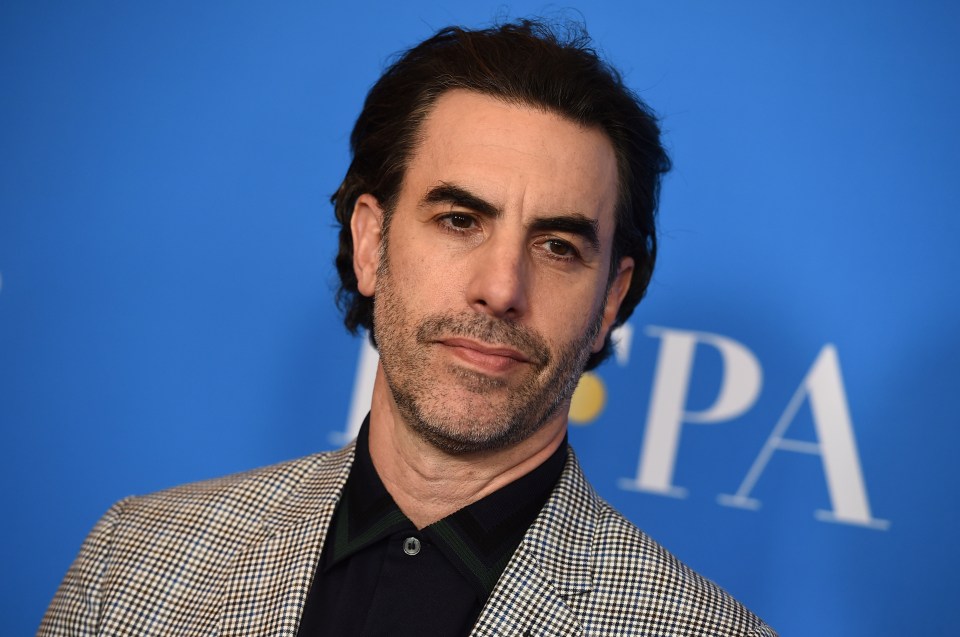SACHA Baron Cohen told TikTok execs they are “creating the biggest anti-Semitic movement since the Nazis” after the platform was flooded with hate content.
The actor and other Jewish celebrities confronted bosses in a private call as they battle accusations TikTok has allowed a torrent of pro-Hamas videos and hatred against Jews.
APActor Sacha Baron Cohen was one of a dozen celebrities and TikTok creators who slammed the app[/caption]
Hamas fighters heading towards the Israeli border during the October 7 attacks
The Mega AgencyAmy Schumer was also present on the call set up by TikTok executives to discuss concerns of antisemitism[/caption]
The most recent example came this week as videos of young influencers discussing Osama bin Laden’s “Letter to America” circulated widely in a disturbing new trend.
App executives arranged a call on Wednesday with over a dozen Jewish celebrities and TikTok creators, including Baron Cohen, to discuss their concerns.
The Borat actor slammed the company, claiming it had fostered hate among users and telling TikTok’s head of operations “shame on you”.
“If you think back to October 7, the reason why Hamas were able to behead young people and rape women was they were fed images from when they were small kids that led them to hate,” Baron Cohen said on the call, according to the New York Times.
He accused the app of platforming similarly influential and provocative content to young people.
And raged to executives that TikTok “is creating the biggest antisemitic movement since the Nazis”.
Amy Schumer and Debra Messing were among the other celebrities on the call, which involved over 30 people.
Celebrities and users of the app revealed their heartbreaking experiences on the platform after sending an open letter to the company last week.
They claimed that TikTok had not stopped comments like “Hitler was right”, or “I hope you end up like Anne Frank”, from being posted under their videos and others.
Head of operations Adam Presser and global head of user operations Seth Melnick wanted to hear specifics about the experiences of those on the call in hopes of improving the platform.
Baron Cohen highlighted the circulation of violent images on the platform and said that TikTok has the power to “flip a switch” in tackling the antisemitism.
But Presser claimed there was no “magic button” to fix the concerns raised in the meeting.
Both chief executives, also Jewish, were described by the New York Times as “conciliatory” in the meeting.
Presser agreed there was “truth” to Baron Cohen’s comments about social media companies taking more direct action in such situations.
The Chinese-owned company is battling escalating claims that it is promoting pro-Hamas and anti-Israel content on the app.
It said on Thursday that it was “proactively and aggressively removing” videos from the app showing influencers discussing bin Laden’s “Letter to America”.
Many creators – often American – have been posting clips on TikTok where they discuss the manifesto and even encourage people to read it.
The most watched clip, with over a million views, is a scrolling video of the PDF for people to read.
Al-Qaeda leader Osama Bin Laden issued the twisted 4,000-word manifesto to lay out his hatred of the West a year after the horrific Twin Towers attack.
The terror chief tried to justify the 9/11 atrocities on the US, railed against America and made a chilling demand for the Jewish state to be destroyed.
A spokesperson told The Sun: “Content promoting this letter clearly violates our rules on supporting any form of terrorism.”
One TikTok user on Wednesday’s call said the letter had become the “talk of the app”.
They said: “In regards to trending topics right now as we speak, this trend needs to end. This app needs to ban this letter.”
Several other users of the app said they reported harassment to the company but was not able to speak directly to any representatives, and waited three to five days for a response.
Presser said on the call: “To hear that this place, this platform, this community that has brought you so much joy and helps each of you as individuals is becoming a place that feels like somewhere that you’re not sure you want to spend time on, I mean, that’s devastating.”
“This is where we get the feedback, this is where we hear what isn’t working, he added towards the end.
He then told others in the meeting that he was “embarrassed” to admit much of the information was new to him.
Several US lawmakers have called for the app to be banned, arguing that Beijing could be influencing content through certain algorithms.
Both antisemitic and Islamophobic content has increased online since the Israel-Hamas war escalated following the October 7 attacks.
Jewish advocacy group the Anti-Defamation League has claimed that antisemitic content has increased by over 919 per cent on Twitter/X, and 28 per cent on Facebook since the attacks.
“We recognise this is an incredibly difficult and fearful time for millions of people around the world and in our TikTok community,” TikTok told The Sun.
“Our leadership has been meeting with creators, civil society, human rights experts and stakeholders to listen to their experiences and feedback on how TikTok can remain a place for community, discovery, and sharing authentically.”
GettyDebra Messing, another celebrity present during the meeting with TikTok executives, speaks during a March For Israel in Washington DC in November[/caption]
GettyThe company is fighting claims that it is promoting pro-Hamas and anti-Israel content on the app[/caption]

